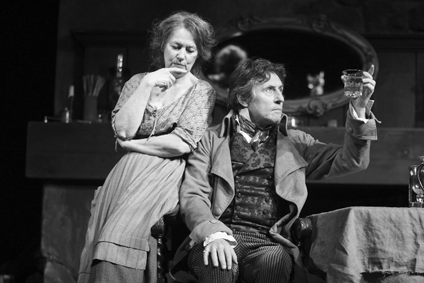Dreams die hard in Roundabout’s timely O’Neill production
Eugene O’Neill was no stranger to the narcissistic alcoholic and the havoc such folk wreak on the lives around them. Yet there is an underlying anger in his portrayal of Cornelius Melody in “A Touch of the Poet” that digs deeper, is more lost in illusion, and more destructive to himself and his family than other O’Neill characters. In this harsh portrait of dissipation and delusion, we see not only the wreck of an individual, but the shallowness of self-aggrandizement that permeates our culture as much today as it did in 1942 when the play was first written.
Despite a life that is crumbling around him, Con, as he is called, insists on maintaining his Irish gentility, and he does so by lording it over his low-born wife Nora, whom he had to marry after impregnating her, and the resulting daughter Sara. Con can only maintain his decaying gentility by buying drinks for his cronies and disparaging his family, and as the drink takes more and more control of his life, he descends into a kind of creeping psychosis.
Throughout the play, we watch as Con defies reality and holds onto one glorious battle where he was praised by the king. It is the same conceit Dickens uses in “Bleak House,” where Mr. Turveydrop maintains his high position by surrounding himself with inferiors, and it is a common trait of the late-stage alcoholic. It is one that Chekhov has used as well, but O’Neill goes for the soul of the man rather than the satire. The touch of the poet is at once something to be revered and vilified, for it is the mark of a man who lives apart—for better, or, in this case, much worse. It is attractive and repellent at the same time, and it is this dichotomy that makes this play so richly human and Con’s journey so painful. His tragedy is that he can still command the love of Nora and Sara, though he cannot accept it, for to do so would be to admit something he sees as a weakness. And so, he dooms himself.
The play takes place in 1827, in Con’s tavern, a confined world where he is free to imagine himself however he wishes—as long as Nora and Sara, who can’t help but love him, support him, which is their tragedy. As long as his world is insulated and protected Con is safe in his own reality. It is only when he must confront the world as it is—a world with which he is woefully out of touch that he loses his grip—that he eventually descends into madness. And you wonder why Roundabout chose this particular time in history to mount this revival?
Doug Hughes’ sweeping production has a wonderful period feel and look. It is uniquely appropriate to the scale of the emotions that fill the stage at Studio 54. O’Neill’s language is rich and poetic, particularly for Con who loves to quote the poetry of Byron with a kind of booming lyricism. As played nearly to perfection by Gabriel Byrne, this romanticism is juxtaposed against a pernicious cruelty that cuts deeply. When he calls his daughter a slut and says she’s not worthy of the man she has fallen in love with, the theater reverberates with his rage, which is both terrifying and pathetic—a magnificent balance that Byrne maintains throughout his performance.
As Nora, Dearbhla Molloy is a mix of fragility and sass, so deeply in love with Con that she supports him even in his destruction. Emily Bergl as Sara is one ray of hope as she stands up to Con and seems, for a time, to be able to escape the fate that befell her mother. Sara has fallen in love with a man who is sick and recuperating at the tavern. When the man’s mother—delightfully played by Kathryn Meisle—arrives, we see both the world that Sara hopes to enter and the distance between the denizens of Con’s tavern and the world they imagine they can take part in.
Santo Loquasto’s set is overwhelming and simple, and his costumes convey both period and character with effective economy. Chris Akerlind’s lighting is subtle and textured, a major component of the play, that takes us into the dark and brooding world of Con, only to be shattered by the brilliant July light that flashes through the door, the few times it is opened.
Dreams die hard, as O’Neill’s characters always learn, but it is the insistence on revealing the truth no matter what the cost that makes this production a refreshingly artful and yet always accessible production of a complex and disturbing play. Sometimes, it’s good to be a little shaken.
gaycitynews.com



































